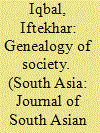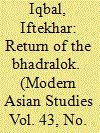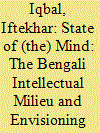|
|
|
Sort Order |
|
|
|
Items / Page
|
|
|
|
|
|
|
| Srl | Item |
| 1 |
ID:
153020


|
|
|
|
|
| Summary/Abstract |
This paper explores the anxious and sometimes hostile relationship between modern forms of civil society and non-modern institutions in Bangladesh. I argue that an uneasy relationship arises from civil society's inability or lack of initiative to identify and negotiate with ‘pre-modern’ social institutions and their remnants, which I conceptualise here as samaj. Such dissonance and disengagement have been historically constructed largely with regard to the way in which the roles of the state, capital and market forces have been conceptualised at the interface between ‘modernity’ and ‘tradition’. This proposition demands a genealogical understanding of the relationship between civil society and samaj, in which the latter is represented by religious institutions such as the khanqah and the madrasa.
|
|
|
|
|
|
|
|
|
|
|
|
|
|
|
|
| 2 |
ID:
091661


|
|
|
|
|
| Summary/Abstract |
Since the late 1970s, historical studies of colonial Bengal have been dominated by the recurrent theme of the 'return of the peasant', generally set against the previously predominant notion that British-created landlords were omnipotent agents of agrarian relations. Although the new historiography restores agency to the peasant, it seeks to attribute the agrarian decline in the late colonial Eastern Bengal, roughly Bangladesh, to the 'rich peasant'. It is argued that the rich peasant wielded hegemonic authority on their poor fellow co-religionists by forging a 'communal bond', while exploiting them from within. Such development is often considered linked to the separatist idea that offered a 'peasant utopia' in the form of Pakistan against perceived Hindu domination. This article, while not altogether denying the role of the rich peasant, argues that the bhadralok, or the non-cultivating middle-class gentry, were far more powerful as a catalyst in agrarian relations in Eastern Bengal than is conceded in contemporary historical debates. In so arguing, this article re-examines the post-structuralist turn that appeared to replace the classical Marxist paradigm of class by that of culture and consciousness.
|
|
|
|
|
|
|
|
|
|
|
|
|
|
|
|
| 3 |
ID:
163821


|
|
|
|
|
| Summary/Abstract |
Drawing on a new digital collection of oral interviews, this essay examines the place and meaning of the state in Bengali thought. In the immediate aftermath of decolonisation, East Bengal intellectuals, without substantial pre-engagement with the colonial state, favoured forms of political action or praxis that longed for a new state—a longing that culminated in the birth of Bangladesh in 1971. Intellectuals connected to West Bengal, already entrenched in their own economic and social multiverse, never entertained the idea of a new state outside India. Instead, a Foucauldian irreverence for the state and its elite became more dominant there, flourishing through Subaltern Studies. Despite these differences perceptible synergies in the Banglaphone thoughtscape took root in the 1980s that spoke to late Cold War anxieties about the future of participatory democracy and the public good. This convergence of thought across Bangladesh and West Bengal reflected the emergence of an intellectual who elided the notional boundaries of the post-colonial state, yet stood ambivalently before the crucible of neo-liberal temporality, exposing the limits of the discursive subject in the late twentieth-century Global South.
|
|
|
|
|
|
|
|
|
|
|
|
|
|
|
|
|
|
|
|
|